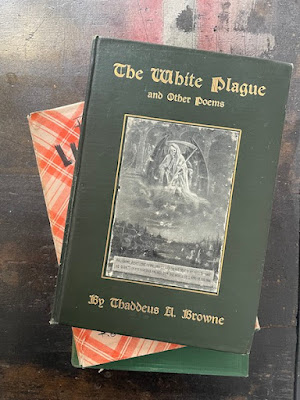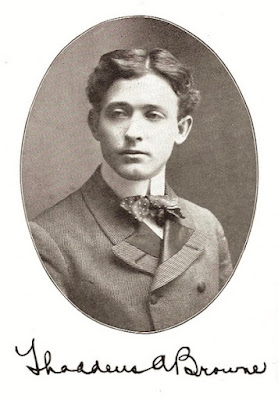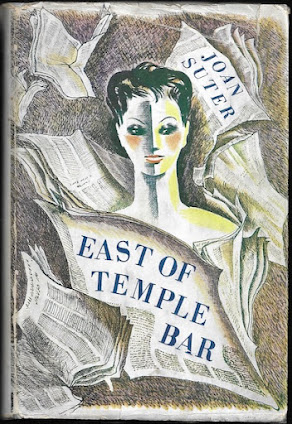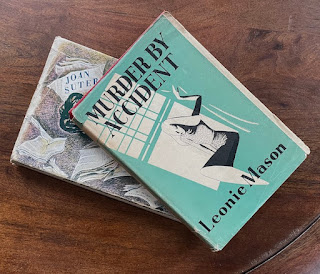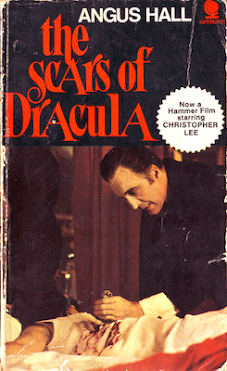10 April 2022
Ten Poems for National Poetry Month, Number 4: 'You' by Ram Spudd Stephen Leacock
07 April 2022
Ten Poems for National Poetry Month, Number 3: 'My Little Suffragette' by Thaddeus A. Browne
Thaddeus A. Browne had a decades-long career as an Ottawa civil servant, though his Citizen obituary (9 March 1935) makes more about his standing as a literary figure.
I'm not sure that Browne was a widely known as a writer of poems and prose; I'd never encountered his name before buying The White Plague and Other Poems (Toronto: William Briggs, 1909). Of its twenty-two poems, 'My Little Suffragette' is the second to take on soldiers in petticoats.
MY LITTLE SUFFRAGETTE
Little blue-eyed suffragette,
What for suffrage calling yet?
Stop your worry, cease your fret,
Don't you see the harm it brings?
If a vote were given you,
Many things no doubt you'd do,You might mould the world anewAs upon its course it swings.
But I want to tell you this,Winsome little suffrage miss,You are keeping me from blissBy your interest in such things.
You have worried my poor mind,You have been to me unkind;Good it is that Love is blind,Or he might have taken wings.
What! you did it just to tease!Little minx, give me a squeeze.Love you give me ecstasiesWhat's your choice of wedding rings?
1878-1935
RIP
04 April 2022
Ten Poems for National Poetry Month, Number 2: 'The Tame Apes' by Robert E. Swanson
Verse from Robert E. Swanson's Rhymes of a Lumberjack (Toronto: Thomas Allen, 1943). The accompanying illustration is by Bert Bushell.
Not the sort of thing I expected from the publisher of "Poet Laureate of the Home" Edna Jaques.
THE TAME APES
Tame apes of the jungle they call us,
He-men of the forest are we;
Who spend our money on poker and booze,
And don't give a damn if we win or lose.
And a carefree life in the forest we choose,
On the slopes by the Western Sea.
We live a tough life when we're working,
We play just as rough in the town;
We're suckers for women who wear high heels,
With well-moulded bodies and looser ideals,
That trip down the street, dolled up in their seals;
Just waiting for us to come down.
We paint the town red when we're spending.
It's drinks on the house by the crock.
Then our friends are many, and women smile.
It's "What is your hurry? Please tarry a while."
But when she's all spent—we walk the last mile
Down to the Union dock.
Then it's "Give you an upper? The hell you say!
You bums can sleep on the floor!"
The world seems cold, and people will shun.
But a tame-ape brother won't see it undone—
He's still got a crock! ... the son of a gun!
So you step in his stateroom door.
"Say! ... Who's pushing' camp up at Kelley's?
They tell me you're running full slam.
Now the air is blue with cigarette smoke—
Someone is trying to tell you a joke;
You kinda forget you're going' broke
To the jungles: but who gives a damn?
So back to the jungles you're headin' once more—
To the brush where the tame-apes roam;
To the little old camp, by a railroad track,
Where the blue smoke curls from the bull cook's shack,
And the smell of the bunkhouse welcomes you back.
By Gawd! but you soon feel at home.
And before the dawn breaks in the morning,
From his bunk the tame-ape will roll.
While still it is dark, he heads for the brush;
When the push-ape hollers, he'll scramble and rush—
Get down on his knees, in the cold damp slush,
And scratch for his choker hole.
Soon the hooker will holler for the straw-line;
Then the apes in the brush don mad.
One runs with the end up the hill, sheer;
When he hollers out "Line!" you get in the clear,
And bound over logs and chunks like a deer;
If you're slow ... well, it's just too bad.
Then you think of the stake thhat you squandered.
And the plans that you conjured before;
So you make them again, in the very same way—
You'll head into town with your heard-earned pay;
But you know in your heart you'll be king for a day,
Then come back to the woods once more.
But life to a woodman is freedom,
Not measured in dollars sublime;
But to come and go and quit when he please,
Not beg for a job on bended knees.
No roadie to tycoons, with rich properties,
Who would see him in Hell—for a dime.
01 April 2022
Ten Poems for National Poetry Month, Number 1: 'Snow in April' by Marjorie Pickthall
Over the boughs that the wind has shaken,Over the sands that are rippled with rain,Over the banks where the buds awakenCold cloud shadows are spreading again.All the musical world is still,When sharp and sudden, a sparrow calls,And down on the grass where the violets shiver,Through the spruce on the height of the hill,Down on the breadths of the shining riverThe faint snow falls.Last weak word of a lord that passes—Why should the burgeoning woods be mute?Spring is abroad in the spiring grassesLife is awake in the robin's flute.But high in the spruce a wind is wailing,And the birds in silence arise and go.Is it that winter is still too nearFor the heart of the world to cast out fear,When over the sky the rack comes sailingAnd suddenly falls the snow?
21 March 2022
Joan Suter, Angus Hall, and the Collector in Me
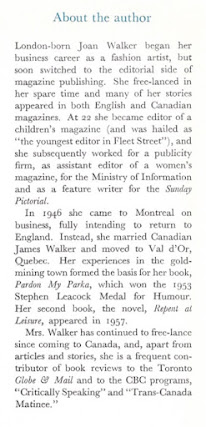 |
| Marriage of Harlequin Joan Walker Toronto: McClelland & Stewart, 1962 |
And then there's this, which may frighten some readers:
14 March 2022
The Dustiest Bookcase: V is for van Vogt
A.E. van Vogt
New York: Signet, 1958
160 pages
The Dustiest Bookcase series is meant to highlight books I've had forever, and have always meant to read and review, but haven't. Destination: Universe is a cheat. It was given to me just last year by someone who knew I liked vintage paperbacks. The pages are loose, the cover is more than scuffed, and still I'm happy to have it, despite my previous encounters with the author.
In the fourteen-year history of the Dusty Bookcase, I've given van Vogt two kicks at the can. I was first dawn into his orbit in by the 1952 Harlequin cover of The House That Stood Still.
(In all seriousness, WTF, Harlequin?)
I disliked The House That Stood Still so much that I included it in my book The Dusty Bookcase. Then gave van Vogt a second chance with Masters of Time, about which I remember nothing. This old review suggests I was unimpressed.
Not really.
02 March 2022
Lunar Attractions; or, The Leacock I Like
Stephen Leacock
Toronto: Gundy, 1915
282 pages
 |
| Montreal: Pocket Books, 1946 First published by Dodd, Mead in 1930 |
“Isn’t it rather late to go there?” I protested.“My dear fellow,” said Mr. Butt warmly, “I don’t mind that a bit. The way I look at it is, here are these two young people, only married a few weeks, just moving into their new house, everything probably upside down, no one there but themselves, no one to cheer them up,”—he was wriggling into his raincoat as he spoke and working himself into a frenzy of benevolence,—“good gracious, I only learned at dinner time that they had come to town, or I’d have been out there days ago,—days ago-”
"Hullo," I called out; "it’s Butt." "I’m awfully sorry," he said, "we’ve gone to bed." "My dear boy," I called back, "don’t apologize at all. Throw me down the key and I’ll wait while you dress. I don’t mind a bit.""Just think of it," continued Mr. Butt, “those two poor souls going to bed at half past ten, through sheer dullness! By George, I was glad I’d come." ‘Now then,’ I said to myself, ‘let’s cheer them up a little, let’s make things a little brighter here.’"
“'He’s ill—some sort of fever—poor chap— been ill three days, and they never told me or sent for me—just like their grit—meant to fight it out alone. I’m going out there at once.” From day to day I had reports from Mr. Butt of the progress of Jones’s illness. “I sit with him every day,” he said. “Poor chap,—he was very bad yesterday for a while, —mind wandered—quite delirious—I could hear him from the next room—seemed to think some one was hunting him—‘Is that damn old fool gone,’ I heard him say. “I went in and soothed him. ‘There is no one here, my dear boy,’ I said, ‘no one, only Butt.’ He turned over and groaned.
“I do,” he answered. “It may be that it is something in my temperament, I suppose one would call it a sort of spiritual mindedness. But I think of it all constantly. Often as I stand here beside the window and see these cars go by”— he indicated a passing street car —“I cannot but realise that the time will come when I am no longer a managing director and wonder whether they will keep on trying to hold the dividend down by improving the rolling stock or will declare profits to inflate the securities. These mysteries beyond the grave fascinate me, sir. Death is a mysterious thing.”
 |
| New York: Dodd, Mead, 1956 |
This novel represents the last word in up-to-date fiction. It is well known that the modern novel has got far beyond the point of mere story-telling. The childish attempt to interest the reader has long since been abandoned by all the best writers. They refuse to do it. The modern novel must convey a message, or else it must paint a picture, or remove a veil, or open a new chapter in human psychology. Otherwise it is no good. SPOOF does all of these things. The reader rises from its perusal perplexed, troubled, and yet so filled with information that rising itself is a difficulty.
“They said they’d sell us tickets. But they questioned us mighty closely; asked where we wanted to go to, what class we meant to travel by, how much luggage we had to register and so on.”
"Stuck it out as best we could: stayed right there in the hotel. Poor Jones was pretty well collapsed! Couldn't do anything but sleep, and eat, and sit in the piazza of the hotel."
Object: A nicely-proportioned hardcover, very typical of its time. My first Canadian edition was purchased three decades ago at the annual McGill Book Fair (held in Redpath Hall, mere metres away from the university's Leacock Building). Price: $1.00. At the end of the volume is found three pages of advertisements for the author's other books: Arcadian Adventures with the Idle Rich, Behind the Beyond, Nonsense Novels, Literary Lapses, and Sunshine Sketches of a Little Town. These are followed by an advert for The International Studio magazine.
Sadly, but unsurprisingly – it was published in 1915, after all – my copy lacks its dust jacket (above).
Should I have expected more for a dollar?
It once belonged to a G.R. England. Going through the 949 Englands in the 1921 census, I find Gordon England (age 19), Gaspard England (age 21), George England (age 51). Gosselin England (age 71)... and that's just Quebec.
Access: Moonbeams from the Larger Lunacy enjoyed several Canadian, British, and American editions before going out of print in the 'twenties. It returned in 1964 as #46 in the New Canadian Library, and remained in print well into the 'eighties. I once purchased a copy with the third series design at Eaton's in downtown Montreal, not 100 meters from the university at which Leacock taught.
Used copies of are both plentiful and inexpensive. If you've got the cash, the one to buy is offered at US$150 by a Milton, Ontario bookseller. It has the dust jacket.


